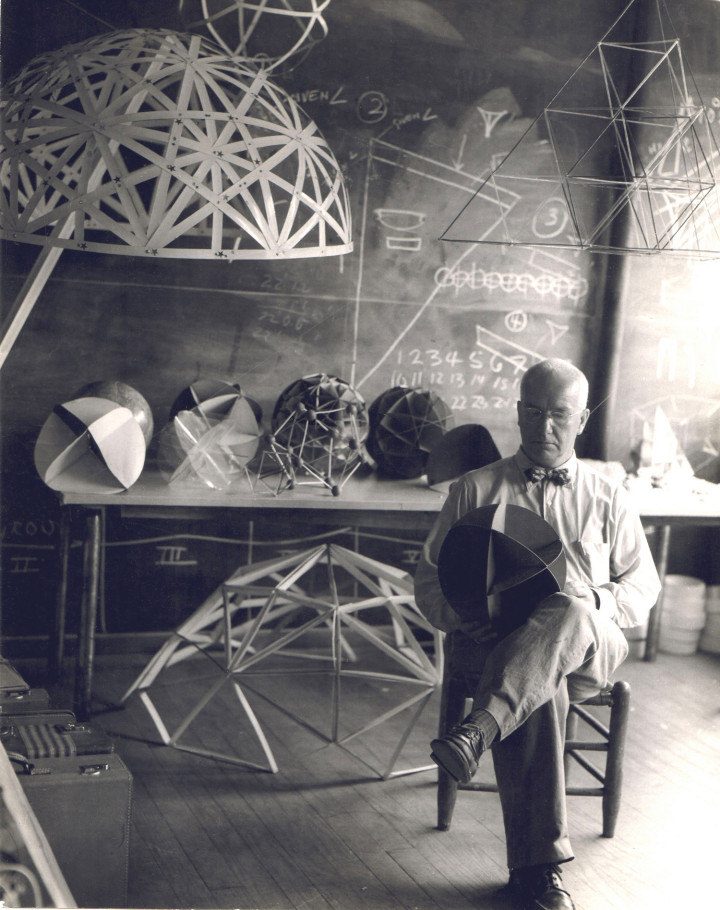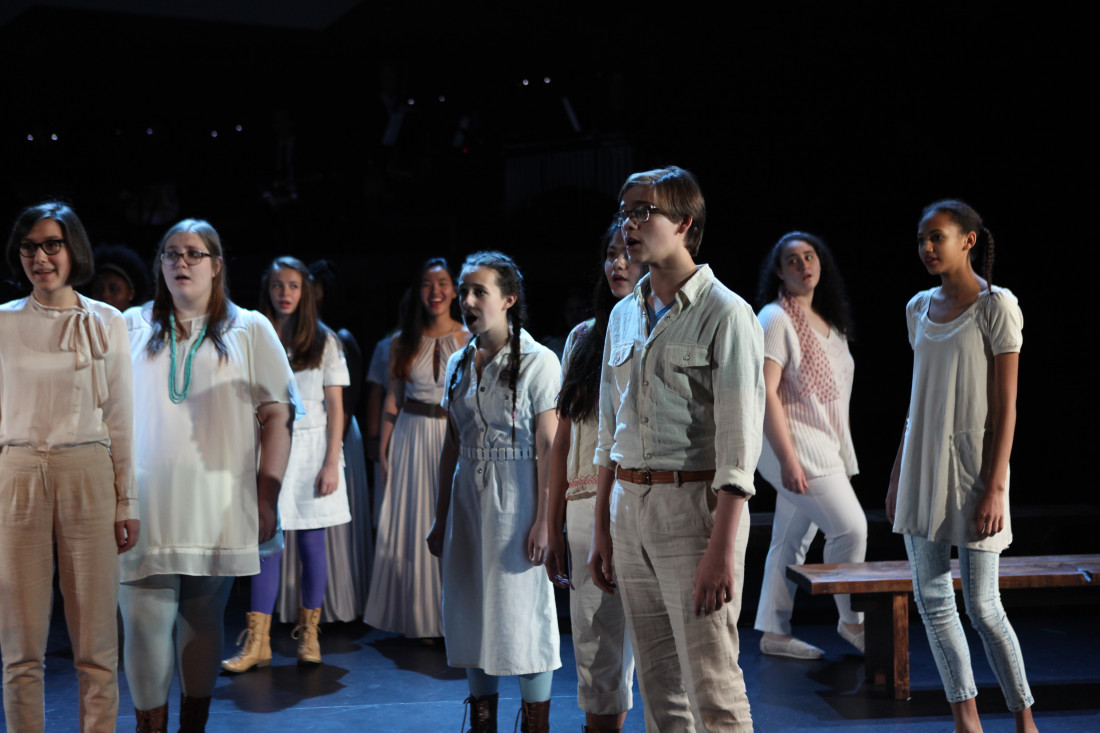Despite a relatively short history (1933-57) and being shuttered more than twice as long as it was open, Black Mountain College is hardly relegated to the history books. The liberal arts institution, with its campus at Lake Eden, boasted an impressive roster of faculty and alumni. And, as the annual ReVIEWING Black Mountain College conference attests, ideas and influences continue to ripple from the legendary school.
Now in its ninth iteration, the conference will be held from Friday, Sept. 29, to Sunday, Oct. 1, at UNC Asheville’s Reuter Center with the theme “Process + Performance.”
Sing about it
A glance at the conference’s participant bios and abstracts reveals Black Mountain College’s reach. Conceptual artist and keynote speaker Mel Chin is known for “inserting art into unlikely places, including destroyed homes, toxic landfills and even popular television, investigating how art can provoke greater social awareness and responsibility,” according to program notes. Ann Dunn, artistic and executive director of the Asheville Ballet, offers the presentation Choreographic Process and Product Through Three Lenses: Balanchine, Cunningham, Dunn. And the Brooklyn Youth Chorus will perform Black Mountain Songs on Friday and Saturday nights at the Diana Wortham Theatre.
The choral group, made up of junior and senior high students from New York City, is excited to bring its program back to the place that inspired it, says founder and artistic director Dianne Berkun Menaker. “To visit some of the buildings where the artwork was created [and] to stand on the lawn where Buckminster Fuller and the students laid out the strips to create the geodesic dome [will] give a whole other perspective,” she explains. “For me, it’s a perfect coming home and a final interpretation of what this piece is about.”
Black Mountain Songs was commissioned by the Brooklyn Youth Chorus and created by Bryce Dessner of The National. It was Dessner — who had previously collaborated with the chorus — who introduced the idea of a series of songs crafted around the writings of Black Mountain College figures. “We were able to capture the poetry, which became one of the main entry points,” says Menaker.
Dessner and co-curator Richard Reed Parry, of Arcade Fire, brought in other composers (for a total of eight contributors) who penned the poignant song cycle. Nico Muhly’s lithe “Fielding Dawson in Franz Kline’s Studio” drew inspiration from Dawson’s writings about being a student of Kline. “He looked at prose that wasn’t actually written as poetry, and that became the text for Nico’s piece,” says Menaker. “People like Caroline [Shaw] took fragments of ideas about artists and their ideology about teaching and learning … and created text from that.”

He’s pictured here, in his Black Mountain College classroom, in 1948. Photo by Hazel Larsen Archer, courtesy of the estate of Hazel Larsen Archer
Dig deep
As Black Mountain Songs illustrates, there are many inroads to appreciating and creating around the essence of Black Mountain College. For Julie J. Thomson, a writer, art historian and documentarian, the introduction to the school came by way of the late collagist and correspondence artist Ray Johnson. Thomson started writing about Johnson, who was a student at the college from 1945 to ’48. “I heard about the conference, and it seemed like the ideal opportunity to present about him,” she says. She’s attended most of the ReVIEWING events, taking each year’s topic as inspiration for a presentation.
This year, Johnson will join the panel discussion “Landscapes of Black Mountain College” and present her project, Mountains Ho!, in which she used archival materials to examine the role the natural surroundings played in the lives of those who dwelled at the Lake Eden campus.
“I’m thinking about [Black Mountain College] as a place and how this place was special to people and was a part of the component, too,” Thomson says. “We always look at the people, and of course they’re tremendous … but the place and all of these dynamics work together in important ways, too.”
Thomson has developed relationships with other researchers and archivists, such as those at the Western Regional Archives — the State Archives of North Carolina’s Asheville-based collections and reference services. “Heather South and David Silver pointed me toward this tremendous collection of letters written by a student from the late ’30s,” says Thomson. Mountains Ho! takes its title from writings by Phyllis Josephs Thomas. “They’re letters to her mother … description of hikes they went on, but also observations of hikes,” she says.
And, in an archived interview with avant-garde filmmaker and teacher Stan Vanderbeek, “He talked about sitting on that side of the mountain. That thinking time and processing time to figure out who he was and who he wanted to be as a person and as an artist,” says Thomson. Photos from the archives — some famous and some lesser-known — were included in Begin to See: The Photographers of Black Mountain College, an exhibition she mounted at the Black Mountain College Museum + Arts Center earlier this year.
“As more people’s archives enter different collections, there’s always new material,” Thomson says.
Keep learning
As time passes, there continue to be more artists inspired by the work that started at Black Mountain College, well beyond the boundaries of that institution. Multimedia composer Carmelo Pampillonio will present his paper Black Mountain College’s Relative Domain of Freedom: Performativity and the Improvisative via Judith Butler, based on the ideas of a philosopher and gender theorist who never attended the college.
Performativity theory is concerned with how identities are constructed and acted out, particularly in how we respond to social norms, Pampillonio explains. “In my paper, I’ll discuss the fact that it was the failure of educational and artistic institutions that led to the formation of Black Mountain College. At the heart, [the college] was an ethical project.”
Despite the fact that Butler wasn’t directly connected to the school, Pampillonio saw her theories as an interesting window through which to reframe it. “In my paper, I’m not painting Black Mountain College to be a utopia, but rather a response to the social climate of its time,” he says.
The ReVIEWING conference’s packed, three-day schedule introduces many more out-of-the-box ideas, all using the college as a jumping-off point. Topics range from poetry and creative literacy to transcendentalism and modernism. The latter is found in interdisciplinary artist Martha McDonald’s presentation, Channeling Xanti Schawinsky, during the conference, and her Active Archive exhibition at BMCM+AC through the end of the year.
Because, when talking about Black Mountain College, its ideas and influences can hardly be expected to fit into a single venue, or a single conference, or a single weekend.
WHAT: ReVIEWING Black Mountain College
WHERE: Reuter Center at UNC Asheville, blackmountaincollege.org/reviewing
WHEN: Friday, Sept. 29, through Sunday, Oct. 1. See website for schedule. Full conference $40 BMCM+AC or OLLI members/$75 nonmembers, daily pass $20/$50, keynote $10/$20, Black Mountain Songs concert $10 for conference attendees, tour of Black Mountain College campus $10



Before you comment
The comments section is here to provide a platform for civil dialogue on the issues we face together as a local community. Xpress is committed to offering this platform for all voices, but when the tone of the discussion gets nasty or strays off topic, we believe many people choose not to participate. Xpress editors are determined to moderate comments to ensure a constructive interchange is maintained. All comments judged not to be in keeping with the spirit of civil discourse will be removed and repeat violators will be banned. See here for our terms of service. Thank you for being part of this effort to promote respectful discussion.